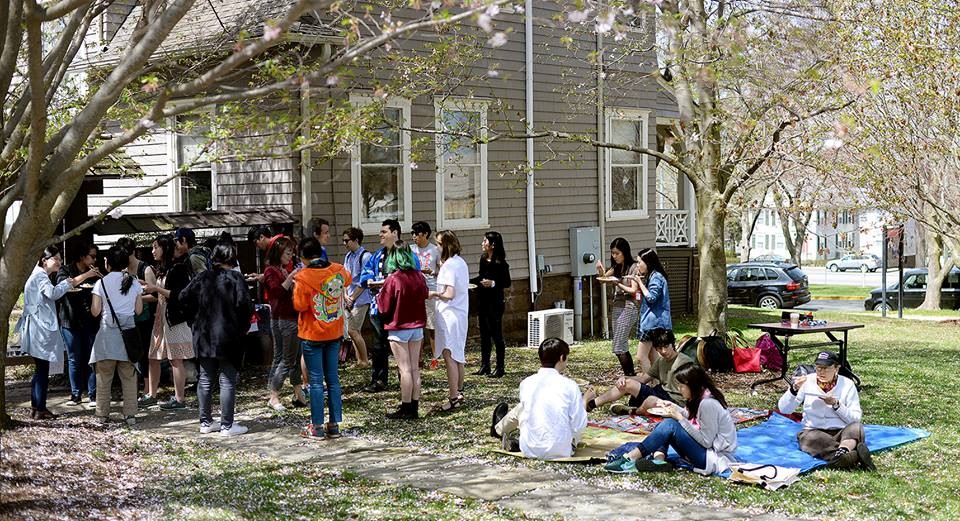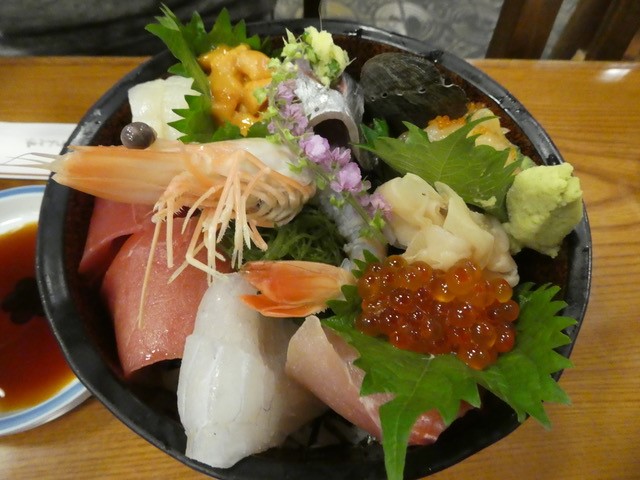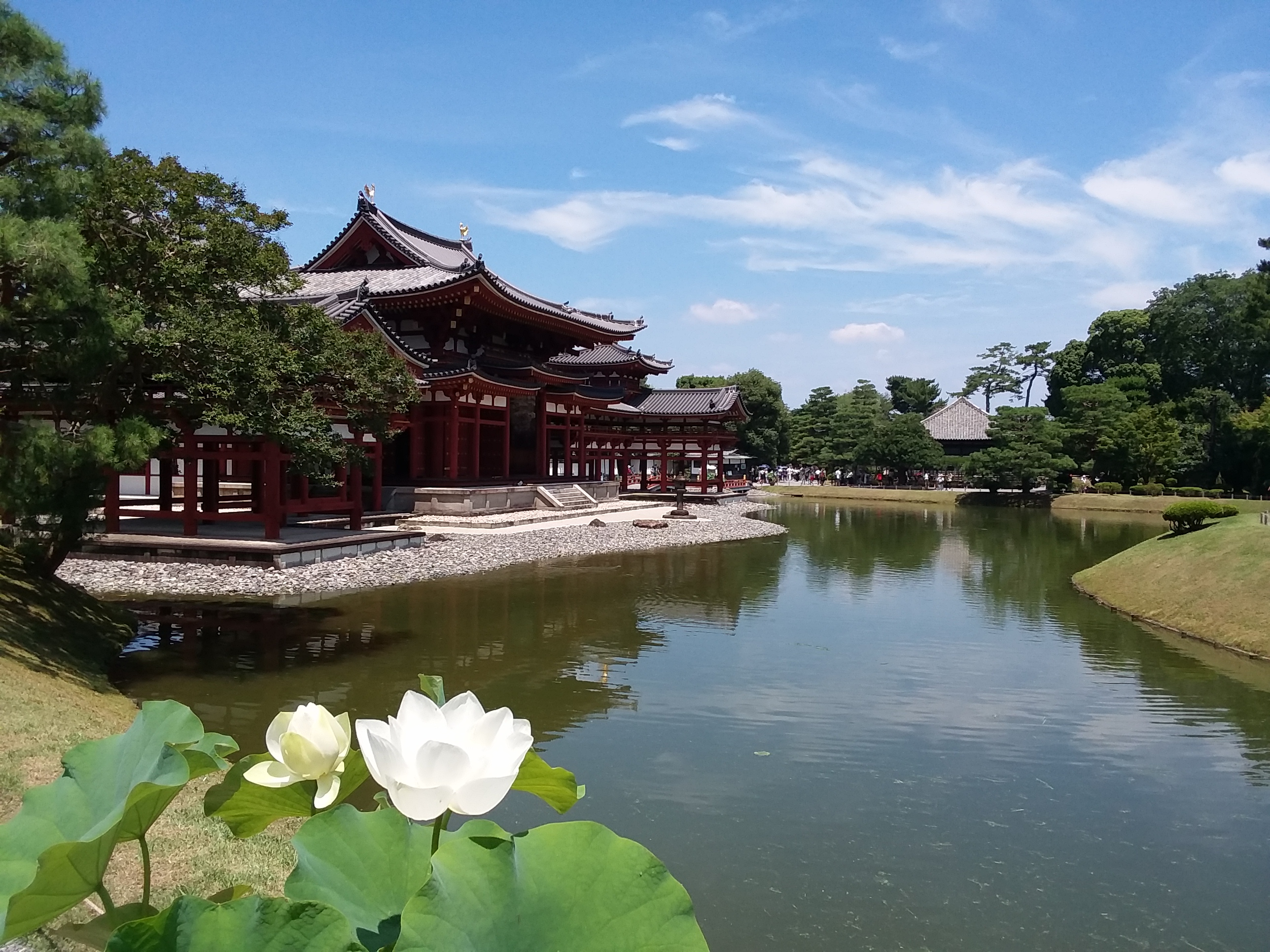JAPANESE LANGUAGE PROGRAM
WELCOME
Wesleyan established its on-campus Japanese Language Program in 1972 with the appointment of a literature specialist who taught the first-year-level Japanese. Prior to that, students interested in learning the Japanese language commuted to Yale University to pursue their study. Within a few years of bringing Japanese classes to campus, Wesleyan added another literature/language position and a second-year Japanese class to its curriculum. Students' enthusiasm for the language grew rapidly and the program expanded to include more language specialists and advanced-level courses and tutorials. Many Japanese language students also began to participate in the Associate Kyoto Program, founded by Wesleyan with several other liberal arts colleges to promote study abroad in Japan. Under the current leadership of Professors Naho Maruta and Miyuki Hatano-Cohen, Wesleyan now offers five levels of language instruction, plus individual and group tutorials.
FREQUENTLY ASKED QUESTIONS
The answers to FAQs can be found on the Japanese Program FAQ page.
FACULTY
- Naho Maruta, Japanese Language and Co-Curricular Coordinator & Associate Professor of the Practice in East Asian Studies
- Miyuki Hatano-Cohen, Assistant Professor of the Practice in East Asian Studies
LANGUAGE PLACEMENT EXAM
Students who have studied Japanese previously (ex. High school or self-taught) may be able to skip introductory courses. An online placement test may be required as well as an in-person oral interview. For questions regarding the Japanese placement test, please contact Professor Maruta (nmaruta@wesleyan.edu).
COURSES
The Japanese language program offers multi-levels of study. Please check WesMaps for current class offerings. The CEAS Major and Minor webpage provides information on fulfilling the requirements.
| Fall | Spring | |
| 1st year level | JAPN103 Genki L1-L8 | JAPN104 Genki L9-L16 |
| 2nd year level | JAPN205 Genki L17-L23 | JAPN206 Tobira L1-L5 |
| 3rd year level | JAPN217 Tobira L6-L9 | JAPN218 Tobira L10-13 |
| 4th year level | JAPN219 Authentic Materials | JAPN220 Authentic Materials |
| *5th year level | JAPN229 Authentic Materials | JAPN230 Authentic Materials |
*5th year level Japanese courses are not offered regularly
Textbook Links:
Genki: An Integrated Course in Elementary Japanese(初級日本語 げんき): https://genki.japantimes.co.jp/
Tobira: Gateway to Advanced Japanese(上級へのとびら): http://tobiraweb.9640.jp/
CEAS frequently offers courses taught in Japanese in conjunction with selected English-language offerings classified as Cultures and Languages across the Curriculum, (CLAC). These content-focused classes include readings, discussion, and in some cases, written assignments in the Japanese language. Native speakers of Japanese are also strongly encouraged to participate in these courses.
CLAC course offerings are indicated on individual course listings within WesMaps and are listed on the Fries Center for Global Studies.
STUDY ABROAD IN JAPAN
Majors in the College of East Asian Studies are strongly encouraged to undertake at least one semester of study abroad in East Asia. Interested students should contact their faculty advisor and relevant language faculty for assistance in selecting an appropriate program. Study abroad typically occurs in the junior year at one of the approved programs listed on the Office of Study Abroad website (Wesleyan.edu/cgs/osa/programs/asia).
SUMMER LANGUAGE STUDY IN JAPAN
The Japanese Program encourages students to take advantage of opportunities for summer language study whenever possible. The intense, immersion programs offered both in the US and in Japan provide unparalleled opportunities to make rapid progress in language learning. The College of East Asian Studies recommends the programs listed below. By completing one of these programs and the credit-transfer procedure, students can receive 2 (two) Wesleyan credits. All study abroad credits, including summer programs, must be approved by the corresponding department(s) regardless of whether or not the credits are intended for the major. Course approvals should be completed prior to departure. Students must fill out the Summer/Winter Study Abroad: Foreign Language form and upload it to their OSA application.
Princeton in Ishikawa (PII), Ishikawa, Japan https://pii.princeton.edu/Hokkaido International Foundation (HIF), Hakodate, Japan http://www.hif.or.jp/en/summer/
Kyoto Consortium for Japanese Studies (KCJS), Kyoto, Japan http://www.kcjs.jp/summer_programs/index.html /
Students who have finished JAPN 104 or JAPN 206 by the end of their spring semester should enroll in PII or HIF programs. The KCJS program is recommended for those who (will) have completed JAPN 206.
Students, who wish to attend summer Japanese language programs not listed above and receive Wesleyan credit, must consult professor Maruta and obtain her approval in advance.
To make summer language study possible for more students, the College of East Asian Studies offers limited financial support. Information on these opportunities is outlined on the Guidelines for Summer Language Support webpage.
ACTIVITIES AND EVENTS
Weekly Japanese Language Table: A language table is a great way to keep up language skills outside of class and offers the opportunity to interact with other Japanese speakers. The lunch meeting may include community members as well as university students and instructors. While the language table is primarily intended for intermediate or higher level students, anyone interested learning Japanese is welcome. Students can leave early or come late and are free to join anytime during the hour.

Annual Ohanami (Cherry Blossom viewing festival): In Japan, the beauty of Sakura (cherry trees) is celebrated every spring with Ohanami. Wesleyan’s Japanese Program holds Ohanami under the beautiful Sakura tree in our Japanese garden at the Mansfield Freeman Center for East Asian Studies around mid-April each year. Our community Ohanami celebration has been featured in Wesleyan's blog, News @ Wesleyan. For more information about the Japanese Garden, please go to the CEAS Japanese garden webpage.
Japanese Language Lunch Lecture Series: The College of East Asian Studies sponsors regular lunchtime lecture/discussions in Japanese throughout the academic year. Both learners and native speakers—students, faculty members, and staff—are welcome to enjoy these informal events.

Conversation Partners: Abundant input is crucial in foreign language learning, and regular and consistent conversations in the target language are extremely important, especially for upper-level students. Students in the third and fourth years of Japanese study are given an opportunity to meet individually each week with a peer native speaker to hold conversations outside of class.
JAPANESE RESOURCES AT WESLEYAN
Textbooks and Resources
Genki
- Genki I textbook (3rd edition) --- Olin Reserve Desk (Floor 1)
- Genki I Workbook (3rd edition) --- Olin Reserve Desk (Floor 1)
- Genki II textbook (3rd edition) --- Olin Reserve Desk (Floor 1) & Science Library Resource Center FGLI Textbook Library (Main Level)
- Genki II Workbook (3rd edition) --- Olin Reserve Desk (Floor 1) & Science Library Resource Center FGLI Textbook Library (Main Level)
Tobira
- Tobira textbook --- Olin Reserve Desk (Floor 1) & Science Library Resource Center FGLI Textbook Library (Main Level)
- Tobira Grammar workbook --- Olin Reserve Desk (Floor 1) & Science Library Resource Center FGLI Textbook Library (Main Level)
- Tobira Kanji workbook --- Olin Reserve Desk (Floor 1) & Science Library Resource Center FGLI Textbook Library (Main Level)
Manga Collection in Smith Reading Room
Manga is a great way to develop your Japanese reading ability. Manga contains short sentences with illustrations showing what is happening, and often includes furigana (pronunciation of Kanji/Chinese characters)—which is especially useful for Japanese language learners. You will also find a variety of colloquial expressions and speech styles as well as Japanese onomatopoeia, and gain a cultural understanding of the objects and practices introduced in the manga.
To search what is available click here.
If the link doesn't work, you can also find them through OneSearch: Type “mnga101” in the “OneSearch” bar. Hit “Search” and you can see the list of manga (10 results, but Vol 1 and Vol2 for each manga = Total 20 manga)
"Tadoku" books at Olin Library
Tadoku (多読)means “reading a lot of books” of your own choice at your own pace so you can take in Japanese without translating. A pack of five mini-books each with a story for the beginning student of Japanese to practice basic vocabulary and reading comprehension are available. This series of booklets are colorfully illustrated and all kanji have furigana (=hiragana equivalent) and the stories use appropriate grammar and vocabulary for intermediate level students.
To search what is available, please click here.
If the link doesn't work, you can also find them through OneSearch. Type “mnga101” in the “OneSearch” bar. Hit “Search” and you can see the list of レベル別日本語多読ライブラリー/ Reberu betsu Nihongo tadoku raiburarī (5 results, from Level 0 (easy) to Level 4 (hard))
Digital Collection Yomiuri Shimbun
ヨミダス歴史館/Yomidas Rekishikan
*To access the database, you must first log into Wesportal.
STUDENT PROJECTS
Video 1
This final project for Intermediate level JAP205 is an introduction to Wesleyan’s campus life for a Japanese speaking audience. Students applied the grammar and vocabulary they learned in class.
Charles Loggins (’19), Sidong Ma (’18), Nahshon Williams (’20)
Video 2
Also a final project for Intermediate level JAPN205, this video is a Power Point presentation of photos students took to introduce Wesleyan’s campus life to a Japanese speaking audience. Students narrate the slides using the grammar and vocabulary they learned in class.
Sterre Hesseling (’22), Alissa Nakamoto (’21)
JAPANESE LANGUAGE STUDENTS IN THE NEWS/STUDENTS' ACHIEVEMENTS
- The 63rd International Speech Contest in Japanese (第63回 外国人による日本語弁論大会)
Felice Li ('24) Finalist
- Stella Zhang ('24)'s interview on her role as a course assistant for Japanese class at the Center for Prison Education: Wesleyan Debuts Japanese Classes at the Center for Prison Education
- 13th Annual Consulate General of Japan in Boston Japanese Language Contest
Kelly Yang ('25) Finalist of the College Advanced Speech Division
- 12th Annual Consulate General of Japan in Boston Japanese Language Contest
Queenie Xie ('23), 1st place winner of the College Advanced Speech Division
- 11th Annual Consulate General of Japan in Boston Japanese Language Contest
Felice Li ('24), 2nd place winner of the College Advanced Speech Division
Diego Hernandez ('24), 3rd place winner of the College Intermediate Essay Division
Ella Biehn ('23), 3rd place winner of the College Advanced Essay Division
- 9th Annual Consulate General of Japan in Boston Japanese Language Contest
Jess Tran ('21), 3rd place winner of the College Intermediate Essay Division
Tran ’21 Wins Japanese Language Essay Contest Prize - 8th Annual Consulate General of Japan in Boston Japanese Language Contest
Zhaoyu Sun ('20), 2nd place winner of the College Intermediate Essay Division
Sun ’20 Wins Japanese Language Contest Prize for Essay - 5th Annual Consulate General of Japan in Boston Japanese Language Contest
Ha Min Kim ('15) Finalist of the College Advanced Speech Division
JAPANESE PROGRAM INSTAGRAM ACCOUNT
The Japanese program has an Instagram account: wes_japanese (https://www.instagram.com/wes_japanese/
This is a private account administered by the Japanese language program at Wesleyan. Only members can see what has been posted. Members in this group are students and native speakers of Japanese at Wesleyan, as well as faculty, staff and members of Wesleyan's Japanese community, and alumni of Wesleyan's Japanese program. If you are interested, please request to follow the account on Instagram. The administrator will be notified and will accept your request if they recognize that you are/were in Wesleyan’s Japanese community (students, faculty, alumni etc). If your request is not approved for more than a week, please send an email to Professor Maruta (nmaruta@wesleyan.edu) and include your account name so she can approve your request.
This account has been created by the Japanese program at Wesleyan in January 2022 with the following objectives:
- To build a broader and stronger Japanese language community and network at Wesleyan.
- To promote the diversity of people in the Japanese program and community.
- To spotlight achievements of people in the Japanese program and community.
- To promote Japanese events on campus and Japan-related news.
Contact Us
Inquiry regarding Japanese Program:
Professor Naho Maruta
Japanese language and co-curricular coordinator
860-685-3458
nmaruta@wesleyan.edu
http://www.wesleyan.edu/academics/faculty/nmaruta/profile.html
Inquiry regarding College of East Asian Studies:
Takeshi Watanabe
Chair, CEAS
860-685-3059
twatanabe@wesleyan.edu
https://www.wesleyan.edu/academics/faculty/twatanabe/profile.html



